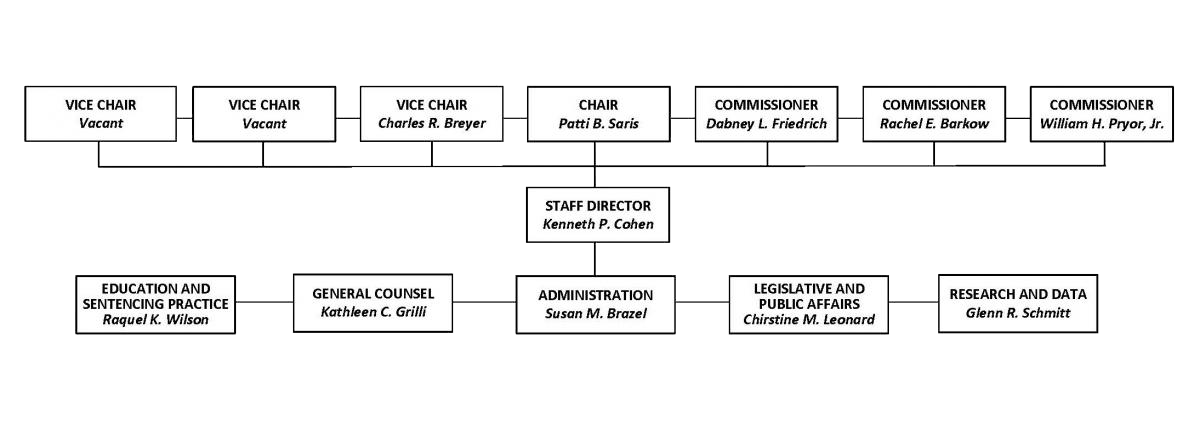Organization
Unlike many special purpose “study” commissions within the executive branch, Congress established the U.S. Sentencing Commission as an ongoing, independent agency within the judicial branch. The seven voting members on the Commission are appointed by the President and confirmed by the Senate, and serve six-year terms. At least three of the commissioners must be federal judges and no more than four may belong to the same political party. The Attorney General is an ex officio member of the Commission, as is the chair of the U.S. Parole Commission.
The Commission staff of approximately 100 employees is divided into five offices with the director of each office reporting to the staff director who in turn reports to the chair. The five offices are — General Counsel, Education and Sentencing Practice, Research and Data, Legislative and Public Affairs, and Administration. The staff director supervises and coordinates all agency functions.

Offices
Office of Research and Data
The Office of Research and Data provides the Commission with statistical and other social science research and analyses on specific sentencing issues and federal crime generally. As part of its work, the office receives documents from the federal courts concerning the sentences imposed on individual offenders, analyzes and enters information from those documents into a comprehensive computer database created and maintained by the Commission, and creates annual datafiles of sentencing information. Working with the Office of the General Counsel, the Office of Research and Data also collects information on organizations convicted of crimes and on appeals filed in individual and organizational cases.
As part of its ongoing work, the Office of Research and Data studies a wide variety of sentencing issues, including changes in the types and severity of federal crimes, changes in the demographic characteristics and criminal history of federal offenders, and sentencing trends in the federal courts. Using Commission data, the office creates periodic reports on federal sentencing practices and tracks the application of the sentencing guidelines. These reports provide data concerning the types of crimes committed, the offenders who commit those crimes, the punishments imposed, and the manner in which the sentencing guidelines were applied. The reports are distributed to the courts, Congress, the Executive Branch, and the public. Using Commission data and other data sources, the Office of Research and Data provides short– and long–term research and analysis for the Commission as part of its work to monitor the use of the guidelines and as it considers amending them. The office also provides projections of the effect on the federal prison population of proposed legislation and proposed guideline amendments. Additionally, the office provides analyses about specific criminal justice and guideline application issues at the request of Congress and the courts.
The office creates datafiles of the Commission’s annual sentencing data and makes that data available to researchers through the Inter–University Consortium for Political and Social Research at the University of Michigan. In fiscal year 2012, the office began making sentencing data available directly to the public through the Commission’s website. Also in fiscal year 2012, the office developed and the Commission launched an Interactive Sourcebook available to the public. Through this interactive website, users can view all of the data reported by the Commission in its annual Sourcebook of Federal Sentencing Statistics as well data from additional analyses, and can tailor all of these analyses by year, judicial district, and judicial circuit.
Office of General Counsel
The Office of General Counsel provides support to the Commission on a variety of legal issues, including the formulation and application of guidelines and guideline amendments, legislative proposals, and statutory interpretations. Legal staff members monitor district and circuit court application and interpretation of the guidelines and advise commissioners about statutes affecting the Commission’s work. The legal staff provides training support in conjunction with the Office of Education and Sentencing Practice.
In addition, the office performs all drafting services for the Commission, prepares the Guidelines Manual for printing, formally manages and maintains all papers and exhibits received by the Commission that constitute requests for Commission action on sentencing policy development, and regularly tracks the Commission’s policy initiatives.
Office of Legislative and Public Affairs
The Office of Legislative and Public Affairs serves as the Commission’s liaison with Congress on sentencing and appropriations matters, monitors Congress’s criminal law agenda, analyzes legislative proposals, drafts congressional testimony, and takes the lead role in responding to congressional inquiries. The office also provides services and information to other external entities, including the judiciary, executive branch, academia, and advocacy groups. The office works closely with the Office of General Counsel on statutory interpretations and analyses.
The office is also responsible for the agency’s public information functions, responding to inquiries and requests for information from the media, the public, attorneys, the criminal justice community, Congress, academia, and government agencies. The office plays a primary role in the coordination, drafting, and editing of many Commission publications (e.g., annual reports, newsletters) and coordinates the production, printing, and dissemination of all hard-copy Commission publications, including the Guidelines Manual and reports to Congress. The office also plays a key role in the coordination of Commission public hearings.
Office of Education and Sentencing Practice
The Office of Education and Sentencing Practice performs the lead role in teaching guideline application to judges, probation officers, prosecuting and defense attorneys, and other criminal justice professionals. The staff develops training materials, participates in the sentencing guideline segments of training programs sponsored by other agencies, works in conjunction with the Federal Judicial Center to create broadcasts that are aired on the Federal Judicial Television Network, and helps inform the Commission about current guideline application practices. The office also operates a “HelpLine” to respond to guideline application questions from members of the court family.
